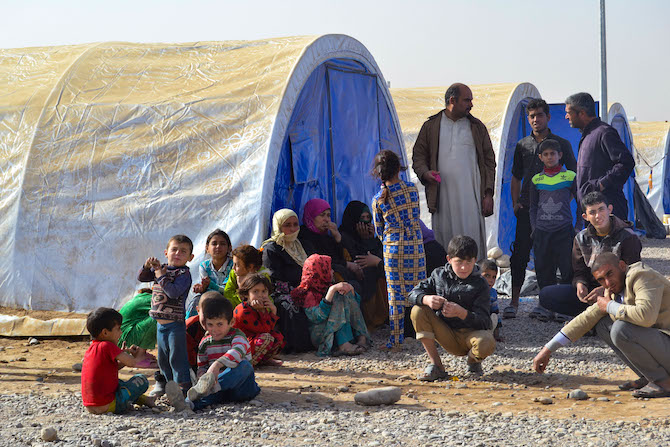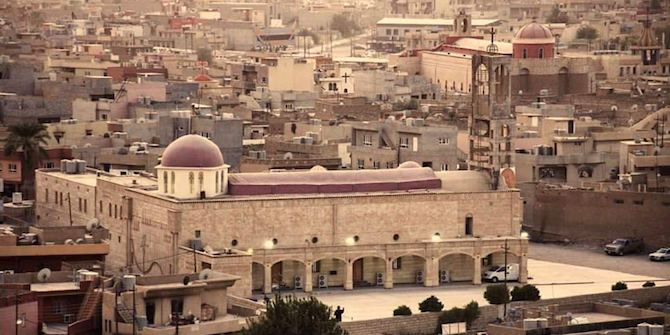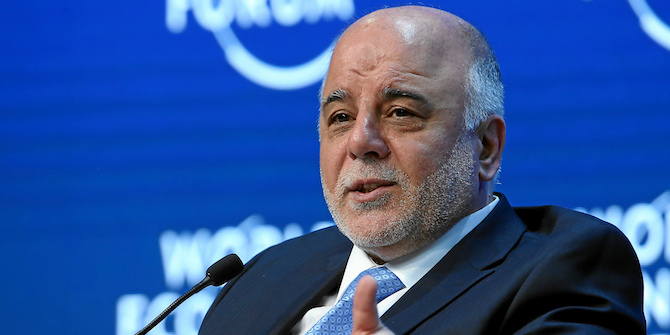by Dylan O’Driscoll and Irene Costantini

Internal displacement has received growing attention as a significant phenomenon that demonstrates the protracted nature of contemporary conflict. In addition to being a consequence and a potential driver of conflict, internal displacement strongly affects the construct of the state, particularly with regards to citizenship. IDPs do not cross international borders and thus their citizenship and the rights that come with it remain intact formally, however, in practice there is often a stark difference between citizens and IDPs.
Iraq witnessed more than three million IDPs as a consequence of the advancement of the Islamic State (IS), which has had a considerable impact on already strained intercommunity relations. Ethnic and religious minorities in northern Iraq – particularly Christians, Shabaks and Yazidis – were caught in the wave of violence as a result of IS and many escaped to the Kurdistan Region of Iraq (KRI) due to its proximity and relative stability. These minorities were left at the crossroad between citizenship and the competition for power in Iraq. Due to its status as a quasi-state, entering the KRI meant entering an altogether differently defined territory within Iraq, where IDPs have been subject to bureaucratic and administrative procedures in many ways similar to those faced by refugees. The existence of a tiered understanding of citizenship in the KRI, and Iraq, meant that citizenship discourses and practices had to adapt to a complex formulation of who is included in and who is excluded from the political community. As a result, there is a difference between the top-down narrative of citizenship formulated by KRI and Iraqi officials and the actual practices of citizenship as experienced by IDPs themselves.
In Iraq, where the internal boundaries are contested and struggled for, citizenship, at least as a practice, becomes contested. With the mass displacement as a result of IS, ethnosectarian considerations have influenced the movement of displaced people, with communities fleeing and clustering in specific parts of the country. As a result, displacement has changed the demographical composition of many parts of the country. For instance, Yazidis concentrated in the Duhok governorate, where they represented 62 percent of IDPs, and Erbil (Ainkawa) hosted a significant share of Christians from Nineveh. Additionally, the homogenisation of people’s movement extended to humanitarian assistance to IDPs, with the creation of ethnosectarian uniformed camps or areas within them. Checkpoints also became borders, drawing new lines between communities and representing selective, arbitrary, or discriminatory practices impeding the movements of some over others.
In the political spaces created by mass displacement, practices of citizenship emerged that reflected the precarious position of IDPs in the construction of the Iraqi state. IDPs associate displacement with being a second-class citizen due to the limits it has on their inclusion in the political community as well as the obstacles it imposes on daily life, such as extra bureaucratic procedures and limited economic opportunities. For example, in the KRI, IDPs have to apply for residency just as any international would do based on a thorough security screening and decision by the Kurdish security apparatus. They also have issues registering land, and to obtain lost legal documents IDPs often have to travel to their governorate of origin or Baghdad, which can be a significant financial burden as well as a security risk. This is even more pronounced when considering that Syrian Kurdish refugees find easier access to the labour market in the KRI than Iraqi IDPs. These practices of exclusion originate from a very different understanding of what Iraqi citizenship means in the KRI, given its aspiration for independence.
From a Kurdish perspective, the inflow of IDPs created concerns over it altering the social fabric of the region. As a result, the Kurdish leadership developed political narratives that catered to different audiences. Towards ethnic and religious minorities, they repeatedly stressed their role as ‘protectors’ with equal citizenship and attempted to set themselves apart from the rest of Iraq. For instance, in 2015 the prime minister at the time, Nechirvan Barzani, stated that ‘we do not consider Christians as minorities, but rather they have deep roots in this region. Majority and minority – it is not a matter of numbers’. However, Erbil is also attempting to extend control over the territories from where these minorities originated, most of which are disputed. For instance, a referendum for Kurdish independence held on 25 September 2017 included some of the disputed areas between Baghdad and Erbil, such as Sinjar, Kirkuk, Khanaqin and Makhmour. In this respect the citizenship of displaced minorities was connected to the expansion of a territorial entity seeking independence. Thus, there is a marked difference between a narrative of inclusion giving minorities the right to decide their own future and a practice of exclusion based on a zero-sum-game between Erbil and Baghdad.
To gain the support of the international community, these issues then entered a narrative justifying the quest for independence based on the invocation of democratic principles and the KRI as a civic force in drastic opposition to Baghdad, depicted as an entity unconcerned with protecting its population. In contrast, the message to the Kurdish community was very different. The Kurdish leadership included the question of IDPs, and the cost associated with them, in their rhetoric to excuse not paying, and drastically reducing, government salaries. The notion of civic nationalism and the related openness of the KRI was quickly replaced with ethnic nationalism, particularly in the campaigning for the independence referendum with talk of a Kurdish homeland, shared Kurdish suffering, and the feeling that the Kurds’ time had come. Although this language was used to get the Kurdish population behind the referendum, it was exclusionary in nature and defined citizenship as connected to Kurdish identity. As a result, ethnic and religious minorities residing in the KRI expressed concern as the referendum approached.
To summarise, what we demonstrate is that displacement in Iraq has been accompanied by practices and narratives meant to include IDPs in a particularistic articulation of belonging rather than to ensure a substantive participation as Iraqi or KRI citizens. Rhetoric around citizenship in Iraq changes between civic and ethnosectarian belonging based on conflict dynamics and the competition for power, whilst remaining ethnosectarian in reality. In other words, minorities are ethnicised or de-ethnicised depending on the aim of the elites and their audience at the time.
Thus, IDPs and their citizenship have become entangled in wider ethnosectarian competition in Iraq and narratives and practices of citizenship change to fit the objectives of these wider actors, mainly Baghdad and Erbil, rather than being based on inclusiveness and civic identity. In conclusion, displacement becomes an important lens in the study of nation building, citizenship, territorial control, and most importantly the cyclical nature of violence in Iraq.
This post is developed from the new article ‘Practices of exclusion, narratives of inclusion: Violence, population movements and identity politics in post-2014 northern Iraq’, published in Ethnicities (June 2019).
 Dylan O’Driscoll is a researcher in the Governance and Society Programme at the Stockholm International Peace Research Institute (SIPRI). His work focuses on broadly defined inclusion and his main research area is ethnosectarian conflict in the Middle East, particularly Iraq where he has spent two years conducting fieldwork. Dylan is also currently a Conflict Research Fellow at the Social Science Research Council, New York. He previously worked as a researcher at the Humanitarian and Conflict Response Institute (HCRI) at the University of Manchester. He tweets at @odriscoll_dylan
Dylan O’Driscoll is a researcher in the Governance and Society Programme at the Stockholm International Peace Research Institute (SIPRI). His work focuses on broadly defined inclusion and his main research area is ethnosectarian conflict in the Middle East, particularly Iraq where he has spent two years conducting fieldwork. Dylan is also currently a Conflict Research Fellow at the Social Science Research Council, New York. He previously worked as a researcher at the Humanitarian and Conflict Response Institute (HCRI) at the University of Manchester. He tweets at @odriscoll_dylan
 Irene Costantini is a postdoc researcher at the University of Naples, ‘L’Orientale’. She has worked at MERI, Erbil, Iraq and at the Post-war Reconstruction and Development Unit, University of York. Her research interests include the politics of conflict, post-conflict transition and statebuilding interventions, as well as state transformation in the MENA region, focusing on Iraq and Libya. She is the author of Statebuilding in the Middle East and North Africa region: The Aftermath of Regime Change (Routledge, 2018) and she has published in International Peacekeeping, the Journal of Intervention and Statebuilding, Conflict, Security & Development, and The International Spectator among others. She tweets at @IreneCostantini
Irene Costantini is a postdoc researcher at the University of Naples, ‘L’Orientale’. She has worked at MERI, Erbil, Iraq and at the Post-war Reconstruction and Development Unit, University of York. Her research interests include the politics of conflict, post-conflict transition and statebuilding interventions, as well as state transformation in the MENA region, focusing on Iraq and Libya. She is the author of Statebuilding in the Middle East and North Africa region: The Aftermath of Regime Change (Routledge, 2018) and she has published in International Peacekeeping, the Journal of Intervention and Statebuilding, Conflict, Security & Development, and The International Spectator among others. She tweets at @IreneCostantini






